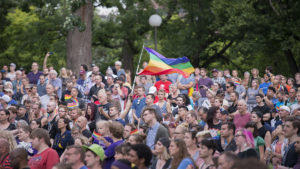Gun Violence and its Aftermath: #WeAreOrlando
 #WeAreOrlando has been a trending hashtag on social media for over a week as people across the world stand in solidarity with the victims of the worst mass shooting in American history that happened in Orlando, Florida on June 13, 2016. A gunman killed 49 people and dozens more were wounded and hospitalized. My initial reaction to this news was, terrifyingly, a lack of surprise. I was then immensely sad for the lives that were lost. The realization that shook me to my core was that shootings have become something that seemed normal. A common occurrence. I have been desensitized to violence, along with many others in America where shootings are frequent. In 2015, there were 372 mass shootings in America. A mass shooting is defined as an incident where at least four people are killed or wounded. 372 mass shootings a year is more than one every day of the year. I had to let that sink in. (You can see a map of shootings across America here: http://www.pbs.org/newshour/rundown/heres-a-map-of-all-the-mass-shootings-in-2015/).
#WeAreOrlando has been a trending hashtag on social media for over a week as people across the world stand in solidarity with the victims of the worst mass shooting in American history that happened in Orlando, Florida on June 13, 2016. A gunman killed 49 people and dozens more were wounded and hospitalized. My initial reaction to this news was, terrifyingly, a lack of surprise. I was then immensely sad for the lives that were lost. The realization that shook me to my core was that shootings have become something that seemed normal. A common occurrence. I have been desensitized to violence, along with many others in America where shootings are frequent. In 2015, there were 372 mass shootings in America. A mass shooting is defined as an incident where at least four people are killed or wounded. 372 mass shootings a year is more than one every day of the year. I had to let that sink in. (You can see a map of shootings across America here: http://www.pbs.org/newshour/rundown/heres-a-map-of-all-the-mass-shootings-in-2015/).
Is there so much gun violence, real and make-believe, on our televisions that we’ve just stopped caring? Has real life just become too much like a first-person video game that we have stopped distinguishing between reality and video games? I hope not. Research has shown that young people exposed to gun violence experience lasting emotional scars. Some children may develop posttraumatic stress disorder (PTSD), which can affect brain development. The psychological trauma of gun violence may lead some people to arm themselves “for protection,” or desensitize them so that they feel less hesitation about engaging in violent acts.
I agree that gun violence in Orlando is a different kind of monster because it combines the shock of a violent act with the possibility of it being classified as a hate crime, especially since it happened in a gay club during Pride Month. The LGBTQ community suffered losses, and after the shooting, many local gay and bisexual men wanted to give blood to help the victims—but they couldn’t. An old Food and Drug Administration (FDA) policy states that any man who has had intercourse with another man in the past year is legally banned from giving blood. It was an experience that combined oppression and rejection of the LGBTQ with emotional loss.
This mix of sorrow and frustration has been in my heart all week, so I looked for ways to get involved in making a change, both in gun violence and by supporting the victims of the shooting and the LGBTQ community. It is easy to feel downtrodden as if everything is out of your control, but here are some options to change that:
- You can contact your elected representative about gun control. You can write them a letter, give them a call, and in some cases, you can even tweet them! Don’t quite know the correct language to use? You can find sample letters here: http://www.huffingtonpost.com/nicole-silverberg/guide-elected-representatives-gun-control_b_8708154.html
- You can also make an effort to support LGBTQ advocacy efforts worldwide. They can be easily Googled, but here is a list of credible campaigns:
- Equality Florida’s GoFundMe https://www.gofundme.com/PulseVictimsFund
- Plantin Peace’s CrowdRise campaign https://www.crowdrise.com/we-stand-with-pulse-fund
- Human Rights Campaign http://www.hrc.org/explore?gclid=CJbcwZiHpc0CFcgjgQodwLYBLA
- Help end the ban on gay men donating blood by signing a petition here: https://petitions.whitehouse.gov/petition/lift-blood-donation-ban-gay-and-bisexual-us-citizens
- And last but not least, do not allow yourself to become desensitized to violence. By taking a stand and encouraging your friends to do the same, we can work to remind people that gun violence should not be as frequent as it has been, and that we have the capability of trying to make a change.
– Kristina

